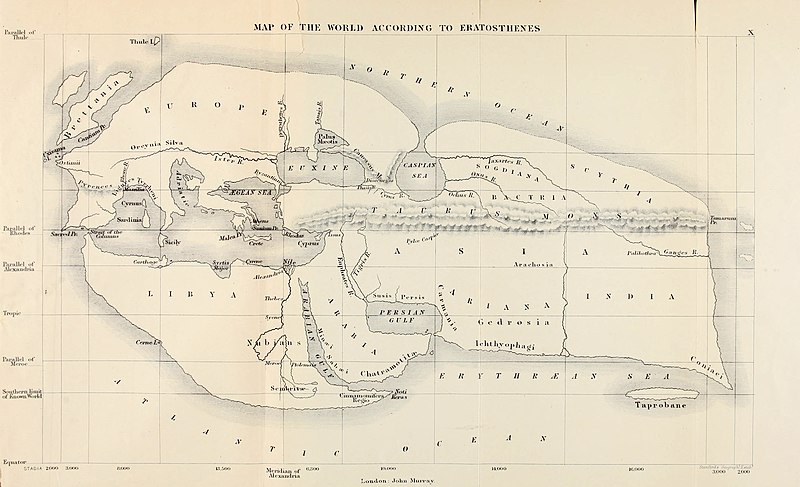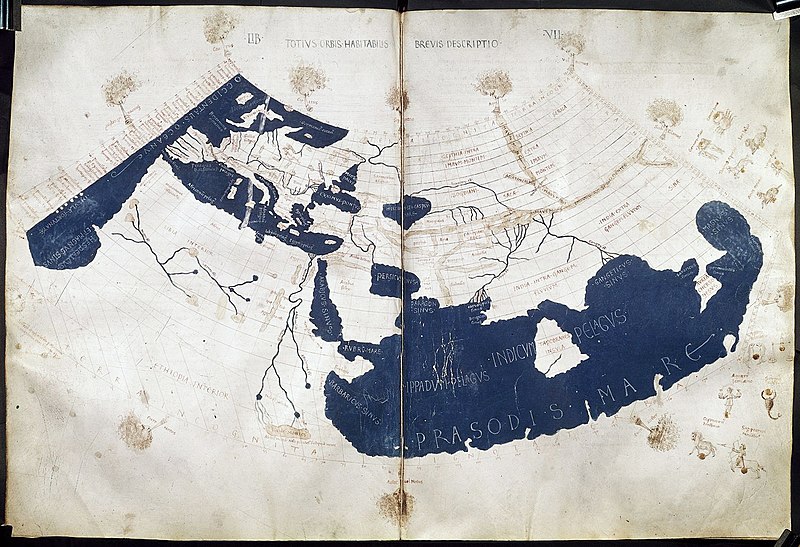Today:
- Announcements
- Sorry: your exams aren't graded yet, and aren't liable to be graded by Wednesday either. But they should be done by next Monday.
- Problems from the rest of Chapter 3 due Wednesday.
- Today:
- Lessons from 4.4
- No Commercial today: the commercial will be a last bit from 4.3 -- geometric series. Spencer is up on Wednesday. Can I get a volunteer for next Monday?
- Lessons from 4.4
- Mathematical Elements, lessons and problems from section 4.4: More Alexandrian Mathematics (Eratosthenes, especially).
- Who was Eratosthenes (276-194 B.C.), of Cyrene (modern-day Libya)?
- Personal:
- Studied some at Plato's academy
- Spent most of his working life in Alexandria, chief librarian at the Museum.
- "foremost scholar of his day" (but not foremost mathematician -- that honor would go to Archimedes) - philosopher, geographer, mathematician, astronomer, historian.
- "Pentathis" - champion in five (usually athletic) events
-
 -- second in all things, first in none?
-- second in all things, first in none?
- Lost his sight? Suicide by starvation?
- Eratosthenes's Map of the World

- latitudes and longitudes (and coordinates for 8000 places)
- circumnavigation of the globe, Spain to India
- The mesolabium (p. 187)
- The Sieve of Eratosthenes (p. 188)
- Commercial break: The sum of a geometric series (IX.35)
(remember this one from the Rhind papyrus?)
- Claudius Ptolemy (90-186 A.D.)
- Supreme authority on astronomy (wrote The Almagest")
- Developed a geocentric model of the solar system:

- Arguments for the geocentric hypothesis? (p. 191)
- "His system as described by the Algamest was perhaps
as complicated, relative to his own time, as Einstein's
relativity theory is to our time." (p. 191)
- Proposed the Equant to account for the fact that observed
orbits were not circular (p. 192). Appolonius (more next time!)
had developed an intricate system of "epicycles" ("circles upon
circles") to account for the irregularities in orbits.
- Ptolemy's extended Eratosthenes's map of the world:

- Published in Rome in 1478
- Columbus possessed a copy!
- "Ptolemy's diminution of the distance between
Europe and Asia by some 50 degrees latitude fortified
Columbus's belief that he could easily reach the Orient
by sailing westward across the Atlantic...." (p. 194)
Website maintained by Andy Long.
Comments appreciated.
-- second in all things, first in none?


